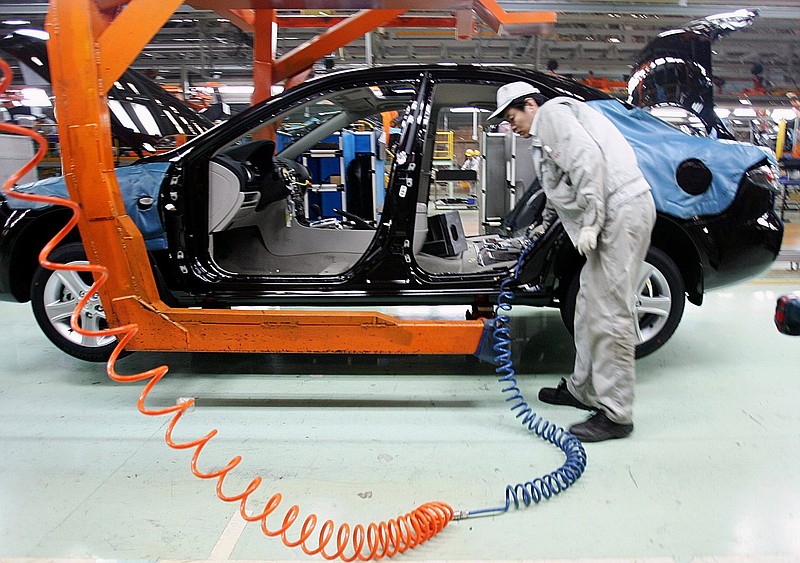Slammed by the long-running chip shortage and surging materials prices, global automakers are now facing a new threat -- lockdowns in some of China's biggest cities.
Toyota and Volkswagen, the world's two largest automakers, suspended production at four plants in Changchun more than two weeks ago when the city 590 miles northeast of Beijing was plunged into lockdown to contain a covid-19 outbreak, and say it's unclear when workers will be able to return. That follows a near two-week shutdown of factories in Tianjin during an outbreak in January.
The threat posed by covid escalated this week when Shanghai -- China's financial capital -- was placed in a phased lockdown to curb a surge in infections. That forced Tesla to suspend production at its factory for at least four days, a blow to the electric-car pioneer given China is the company's second-largest market and the plant builds cars for export to Europe and elsewhere in Asia. Toyota's bus and truck unit Hino Motors Ltd. has also paused production at its engine plant in the city.
China is a manufacturing powerhouse for many industries, but is particularly central to automotive supply chains. The nation churns out around 25 million cars a year -- about one-third of total global production -- as well as countless parts. If China's Covid-Zero policy remains in place, global vehicle production could lose 2% of growth in 2022, equivalent to about 1.5 million units, according to Joshua Cobb, a senior autos analyst at Fitch Solutions. Along with other supply issues, that's likely to push the industry's production recovery into 2023, he said.
"We can think of no risk to the global economy, excluding nuclear warfare, that is greater than the risk of a covid outbreak in China that shutters industrial production," said Carl Weinberg, chief economist at High Frequency Economics in White Plains, N.Y.
The disruptions come at a time when the industry is also under pressure on numerous fronts, from Russia's invasion of Ukraine pushing up commodity prices to the lingering shortage of semiconductors, which has blown out wait times for new car purchases around the world. Both Toyota and VW have, in recent months, been forced to cut production plans in response to the supply turmoil.
For now, the immediate impact of China's covid surge is clear: Toyota and VW are losing output, though both companies declined to provide estimates of just how much. In January, when Toyota was forced to halt production in Tianjin, its China output slumped 16% from a year earlier to 127,967 vehicles.
With "risks rising and tough conditions continuing to persist," it's unlikely Toyota will be able to beat its production targets in coming months, Purchasing Chief Kazunari Kumakura said earlier this month. As covid spreads in China, the potential for further impacts is "undeniable," he said.
Lockdowns are affecting an estimated 71 million people, according to Bloomberg calculations, also denting sales in the world's largest auto market. The shutdowns are having a "direct impact on the number of cars we can deliver to customers," Brian Gu, the president of EV upstart Xpeng Inc. said in a Bloomberg Television interview Tuesday.
Some observers are more confident China will beat back infections and loosen its rigid anti-covid measures. Earlier this month, President Xi Jinping called for the economic and social fallout from the nation's virus elimination strategy to be limited, and while large-scale lockdowns and mass testing drives continue, authorities are making some measures more flexible to avoid severe manufacturing disruptions.
China seems to be sticking with targeted lockdowns that typically don't last more than a month, said Aaron Ho, an analyst at investment research firm CFRA. For firms like Toyota, that's kept production disruptions at a "negligible" level, he said.
Meanwhile, General Motors is managing to keep up production at a joint venture in Shanghai by implementing a closed-loop process, with employees working, living and sleeping in isolation facilities, according to Reuters. VW's plant in Anting, a town in the greater Shanghai area, hasn't been impacted by the lockdown as of Wednesday, according to a company spokeswoman.
"Shanghai, given its importance as a production base for cars and semiconductors, will be an important indicator of how China and its Zero-Covid policy will move forward," said Fitch's Cobb. "At the moment, it all depends on how hard the lockdown is and how long it lasts."
Information for this article was contributed by Chunying Zhang and Jane Pong of Bloomberg News.
